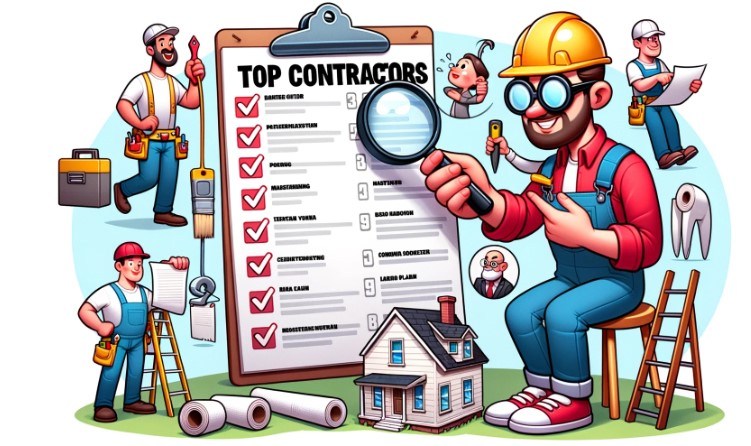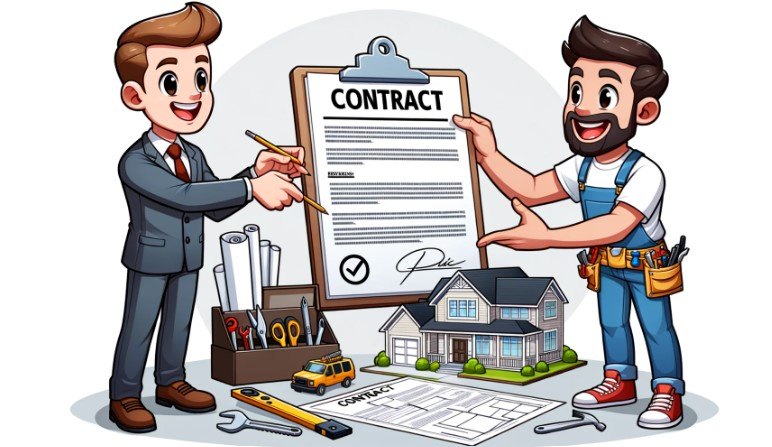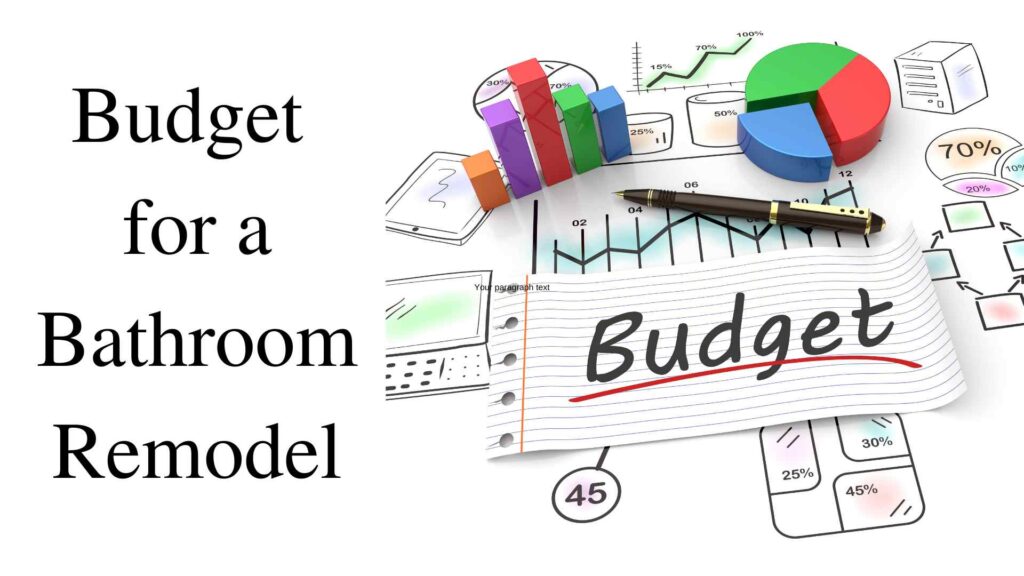Bathroom remodeling is more than just a home improvement project; it’s an investment in your property and daily life. A well-designed bathroom can boost the overall value of your home, enhance its aesthetic appeal, and provide a tranquil space for relaxation and rejuvenation. Below are the essential steps for selecting the best bathroom remodeling contractor.

The Impact of Your Contractor Choice
The contractor you choose plays a pivotal role in determining the success of your bathroom remodeling project. Hiring the right contractor ensures that your vision comes to life with precision, quality, and within your budget.
On the other hand, making a hasty decision can lead to costly mistakes, extended timelines, and overall dissatisfaction with the result.
Setting the Stage
This blog post will guide you through hiring a bathroom remodeler contractor who aligns with your goals and expectations. By following the tips, you can confidently embark on this home improvement journey, knowing you’re making informed decisions at every step.
Understanding Your Needs
Defining the Scope of Your Project Before you even begin your search for a contractor, you must clearly understand what you want to achieve with your bathroom remodel. This could range from simple cosmetic updates like painting and changing fixtures to a complete overhaul involving structural changes.
- Minor Updates: These may include repainting walls, updating faucets, replacing showerheads, or installing new lighting. Such changes can give your bathroom a fresh look without extensive work.
- Major Overhaul: This involves significant changes, such as expanding the bathroom’s footprint, changing the layout, replacing bathtubs with walk-in showers, or adding new features like heated floors or a double vanity.
Setting a Realistic Budget
A clear budget is paramount for any remodeling project. Consider the following when setting yours:
- Materials: The quality and type of materials can significantly affect the cost. Decide whether you want standard, mid-range, or high-end finishes.
- Labor: Depending on the project’s complexity, labor costs can vary. Always allocate a buffer for unforeseen expenses.
- Additional Costs: These include permits, potential plumbing or electrical updates, and any other unexpected challenges that may arise.
Prioritizing Features and Fixtures
List all the features and fixtures you desire in your remodeled bathroom. Once you have a comprehensive list:

- Must-haves: Identify the non-negotiable items or changes you want. These are the elements you’re unwilling to compromise on.
- Nice-to-haves: Features or fixtures that would be great to include but can be omitted if budget or space constraints arise.
- Luxury Additions: If the budget allows, these are premium features like a steam shower, a whirlpool tub, or innovative bathroom technology that can elevate your bathroom experience.
By understanding your needs and setting clear priorities, you’re laying a solid foundation for your bathroom remodeling project. This clarity will help you convey your vision to potential contractors and ensure that you remain focused and within budget.
Researching Potential Contractors
The Importance of Due Diligence
Doing thorough research before entrusting someone responsible for transforming your bathroom is vital. A well-informed choice can save you time, money, and potential heartache.
Personal Recommendations
- Friends & Family: Ask close friends and family members about their experiences. Personal referrals often provide candid feedback and a firsthand account of working with a particular contractor.
- Neighbors: This is especially useful if you’ve seen a recent renovation in your neighborhood that you admire. Neighbors can provide insights into the contractor’s work ethic, timeliness, and professionalism.
Online Reviews and Rating
Platforms to Consider:
Websites like Angie’s List, HomeAdvisor, and Yelp often feature reviews and ratings for local contractors. The Better Business Bureau can also provide information on complaints against the contractor.
Reading Between the Lines: While positive reviews are encouraging, it’s equally important to see how contractors respond to negative feedback. A contractor’s response can show their professionalism and commitment to customer satisfaction.
Reviewing Portfolios
Before-and-After Photos:

A contractor’s portfolio can give you a sense of their style, craftsmanship, and attention to detail. Look for projects similar to yours to gauge their expertise in that particular area.
Variety in Work: A diverse portfolio indicates versatility and a broad skill set. However, ensure that the quality remains consistent across different projects.
Local Home Shows or Expos
- Meet Face-to-Face: Local home improvement shows or expos can be a great place to meet contractors in person, see samples of their work, and ask preliminary questions.
- Gather Information: Collect brochures, business cards, and any promotional materials available. This can be useful for later reference and comparison.
Researching potential contractors is a crucial step in ensuring the success of your bathroom remodeling project. By gathering ample information and being discerning in your approach, you’re setting the stage for a smoother renovation process with results that align with your vision.

Verifying Credentials
Your bathroom is a complex space that intertwines plumbing, electrical, and structural elements. Ensuring your contractor has the proper credentials isn’t just about quality and safety.
Licensing
- State Requirements: Licensing requirements can vary from state to state. Ensure that your contractor holds a valid license in your specific state.
- Specialized Licenses: Depending on the nature of your remodel, specialized licenses (such as plumbing or electrical) might be required.
Insurance
- Liability Insurance: This protects you if there’s any damage to your property during the renovation process.
- Worker’s Compensation: Ensures you won’t be held liable if a worker gets injured on your property.
Certifications
- Professional Associations: Check if the contractor is a member of professional associations like the National Association of the Remodeling Industry (NARI) or the National Kitchen & Bath Association (NKBA). Membership often indicates a commitment to professional growth and adherence to industry standards.
- Specialized Certifications: Some contractors might hold certifications in specific areas, such as green building practices or accessibility improvements. These can be beneficial depending on the goals of your remodel.
Affiliations
- Supplier Affiliations: A contractor’s relationship with suppliers can provide insights into their reputation in the industry. Reliable contractors often have strong ties with their suppliers, ensuring timely delivery and potential discounts on materials.
- Verifying a contractor’s credentials is a vital step in the hiring process. Knowing that you’re entrusting your bathroom remodel to a qualified, reputable professional offers you peace of mind. Always remember: cutting corners when verifying credentials can lead to costly mistakes down the line.
Conducting Interviews
The Value of Face-to-Face Interaction: While credentials and portfolios provide a factual basis for evaluation, interviews offer a personal touch. They allow you to gauge the contractor’s communication skills, professionalism, and compatibility with your project vision.
Schedule an Appointment
- Appointment Setting: Choose a convenient time for both parties. If possible, conduct the interview in the space you’re looking to remodel, providing context to the contractor.
- Preparation: Have a list of questions and topics you want to cover. This ensures you don’t miss out on any crucial details.

Key Questions to Ask
Experience: How many years have they been in the remodeling business? Have they handled projects similar to yours?
Timeline: What’s the projected timeline for completion? How does the contractor handle delays?
Subcontractors: Will they be using subcontractors? If so, how do they vet them?
Communication: How often and through what means will you receive updates? Who will be your primary point of contact?
Payment Structure: How is payment structured? Is a deposit required? When are subsequent payments due?
Observations to Make
Active Listening: Does the contractor listen to your concerns and preferences actively? Do they offer solutions or push their agenda?
Professionalism: Are they punctual for the interview? Do they professionally present themselves?
References: Are they willing to provide references from past clients? A confident contractor should have no issue with this request.
Red Flags to Watch Out For
- Vague Answers: Contractors who are evasive or provide vague answers to direct questions.
- High-Pressure Tactics: Beware of contractors who pressure you into making quick decisions or signing contracts immediately.
- Significantly Lower Estimates: A competitive price is appealing, but a significantly lower estimate might indicate shortcuts or subpar materials. The interview process is your opportunity to get a personal feel for potential contractors.
It’s about understanding their capabilities and ensuring a good working relationship. A transparent, communicative contractor can distinguish between smooth and stressful remodeling processes.
Asking for References
Why References Matter References provide an unfiltered glimpse into a contractor’s past work, offering insights that might not be immediately apparent in portfolios or during interviews. They can validate the contractor’s claims and tell you what to expect during your remodeling project.
How to Approach References
Requesting Contact Details: Ideally, a contractor should willingly provide you with the contact information of past clients. If they hesitate, it might be a red flag.
Diversifying Your Inquiries: Ask for references from recent and older projects. This gives you a perspective on the contractor’s current quality of work and how it holds up over time.
Key Questions to Ask References
- Satisfaction Level: Were they satisfied with the outcome? Did the result match their expectations?
- Communication and Professionalism: How was the contractor’s communication throughout the project? Were they professional and respectful?
- Handling of Issues: Were there any challenges or unexpected issues? How did the contractor handle them?
- Timeline Adherence: Did the contractor complete the project within the promised timeline? If there were delays, were they communicated effectively?
- Budget Adherence: Did the project stay within the budget? Were there any unexpected costs?
Visiting Completed Projects (If Possible)
Seeing is Believing: If the past client is open to it, consider visiting the remodeled space. This allows you to assess the quality of work firsthand and ask questions about specific features or materials.
Durability Over Time: For older projects, observe how the remodeling work has held up over the years. This can give you an idea of the longevity and durability of the contractor’s work.
Interpreting Feedback
Objective Analysis: Remember that individual experiences can vary. Take each reference’s feedback into account, but also consider the overall pattern in the feedback you receive.
Trust Your Gut: If multiple references voice similar concerns or praises, it’s likely a consistent trait of the contractor.
References are a vital tool in your decision-making arsenal. They provide real-world feedback on a contractor’s work and conduct, helping you make an informed choice for your bathroom remodeling project.
Getting Written Estimates
A written estimate is more than just a price tag; it’s a detailed breakdown of costs associated with your bathroom remodeling project. This document helps you budget and ensures transparency between you and the contractor.
Components of a Comprehensive Estimate

- Labor Costs: A breakdown of the costs associated with the manpower required for the project. This might include hourly rates or a total labor charge.
- Material Costs: Detailed listing of all materials required, from tiles and fixtures to paint and sealants, along with their respective costs.
- Permit Fees: If your remodel requires permits, their fees should be included in the estimate.
- Additional Services: Some contractors might offer additional services like design consultation, debris removal, or post-project cleaning. These should be listed with their associated costs.
Comparing Estimates
Apples to Apples: When comparing estimates from different contractors, compare similar components. For instance, one contractor might include premium materials, while another might quote for standard ones.
Total Cost vs. Value: Don’t just focus on the bottom line. Consider each contractor’s value in experience, craftsmanship, and materials used.
Understanding Potential Variables
Unexpected Complications: Bathrooms can have hidden issues like water damage or outdated plumbing. Understand how such unforeseen challenges will affect the estimate.
Material Price Fluctuations: Prices of materials can vary depending on market conditions, availability, or global events. Some estimates might have provisions for such fluctuations.
Ensuring No Hidden Fees
Transparency is Key: A trustworthy contractor will be upfront about all costs. Ask if there are any potential charges not included in the estimate.
Payment Structure: Understand the payment schedule. Are there upfront deposits? When are subsequent payments due? Is there a final payment upon completion?
Finalizing the Estimate
Negotiations: If there are areas of the estimate you’re uncomfortable with, discuss them with the contractor. They might offer alternatives or explain the reasoning behind certain costs.
Signing Off: Once you’re satisfied with the estimate, both parties should sign it. This document can then serve as a reference point throughout the remodeling process.
A detailed written estimate provides clarity and safeguards against potential misunderstandings. It forms the financial foundation of your bathroom remodeling project, ensuring you get the best value for your investment.
Reviewing Contract Details
A contract is a binding agreement between you and the contractor outlining the remodeling project’s expectations, responsibilities, and terms. It’s essential for protecting both parties’ interests and ensuring a smooth execution of the remodel.
Critical Components of a Bathroom Remodeling Contract
- Project Description: A detailed description of the work to be done, including the scope of the project, materials to be used, and any special requests or features.
- Timeline: Start and projected completion dates and any potential delays provisions. This section might also include milestones or phases of the project.
- Payment Terms: A clear breakdown of the payment schedule. This should detail amounts, due dates, acceptable payment methods, and any penalties for late payments.
- Change Orders: Procedures for requesting and approving changes to the original scope of work. This ensures any modifications are documented and agreed upon by both parties.
- Warranties and Guarantees: Information about any warranties on materials or guarantees on workmanship. This section should specify the duration and terms of these guarantees.
- Insurance and Liabilities: Confirmation that the contractor has valid insurance, protecting you from potential liabilities like property damage or injuries on site.
- Termination Clause: Conditions under which either party can terminate the contract. This might include provisions for breaches, unresolved disputes, or extended delays.
Things to Watch Out For
- Vague Terms: Ensure that all descriptions and terms are specific and clear. Avoid contracts with ambiguous language that might lead to misunderstandings.
- Missing Details: Ensure that all discussions and agreements made during the estimation and negotiation phases are reflected in the contract.
- Unfair Clauses: Be wary of any terms that heavily favor the contractor at your expense. This might include severe penalties for minor delays on your part or limited accountability on the contractor’s part.
Seeking Legal Counsel
When to Consider: If you’re unsure about any terms or feel overwhelmed by the contract’s complexity, seeking advice from a legal professional might be beneficial.
Peace of Mind: Having a lawyer review the contract can offer peace of mind, ensuring that your interests are adequately protected.
The contract serves as the roadmap for your bathroom remodeling project. It’s a tool that ensures transparency, sets mutual expectations, and provides a framework for resolving any challenges. Taking the time to review and understand the contract thoroughly is an investment in the success of your remodel.
Trusting Your Instincts
Tuning Into Your Intuition When hiring a contractor, while credentials, references, and contracts are crucial, listening to your gut feelings is equally important. Your intuition can be a powerful tool in assessing the potential working relationship and the overall fit of the contractor for your project.

Initial Impressions Matter
Professionalism: How did the contractor present themselves during your first interaction? Were they punctual, prepared, and attentive?
Communication: Was the contractor easy to communicate with? Did they listen to your concerns and provide clear answers?
Assessing Comfort Level
Open Dialogue: You should feel comfortable discussing your ideas, preferences, and any concerns with the contractor. A good contractor will value your input and collaborate with you.
Trustworthiness: Ask yourself if you trust this person to work in your home, especially if you won’t always be present. Your sense of security is paramount.
Observing Red Flags
- Pressure Tactics: Be wary of contractors who pressure you to make quick decisions, sign contracts immediately, or make large upfront payments.
- Inconsistencies: If you notice discrepancies between what the contractor says and their references or written documents, trust your instincts and seek clarity.
- Lack of Transparency: A reliable contractor will be transparent about costs, timelines, and potential challenges. If you feel something is being hidden or downplayed, it might be a sign to reconsider.
Balancing Instincts with Research
- Validating Feelings: If your gut raises concerns, revisit your research or seek additional references to validate or challenge those feelings.
- Asking for Time: If you’re unsure, don’t rush. Take time to reflect, reassess, and, if necessary, meet with the contractor again or explore other options.
Your intuition and diligent research can guide you in selecting the right contractor for your bathroom remodel. Remember that this is a partnership; feeling confident and comfortable with your choice will contribute significantly to the project’s success.
Reflecting on the Journey Embarking on a bathroom remodeling project is exciting and daunting. From envisioning your dream bathroom to meticulously planning every detail, the journey requires careful consideration and informed decisions.

Your choice of a bathroom remodeler contractor can make or break the experience. As you’ve navigated through the steps—from understanding your needs to trusting your instincts—you’ve armed yourself with the tools and knowledge to make a choice that aligns with your vision and ensures a seamless remodeling process.
It cannot be overstated how essential due diligence is. Investing time in research, interviews, and reference checks safeguards your investment and paves the way for a successful remodel that adds value to your home and enhances your daily life.
While the process may seem overwhelming, remember that the goal is a beautifully remodeled bathroom tailored to your preferences and needs. Stay patient, stay informed, and trust your ability to make the right choices.
Keep this guide as a reference as you proceed with your bathroom remodeling project.




